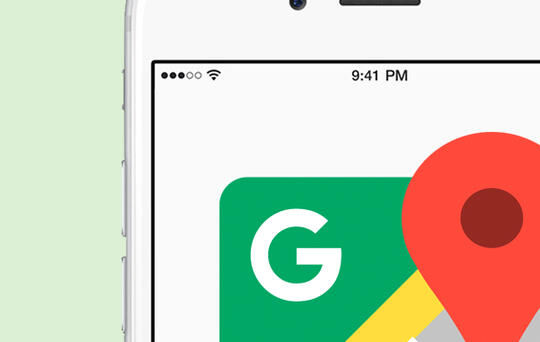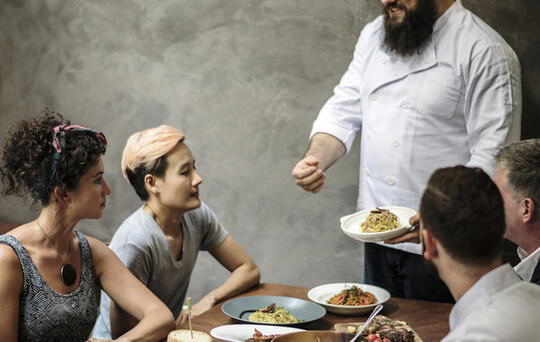14 questions that clients ask the waiter and how to answer them

How many questions do customers ask restaurant waiters during a dinner service? Enough to necessitate having assertive answers if we want to earn their loyalty. The good news is that there are situations that repeatedly occur in the dining room and that create doubt among customers that is also recurring. If we detect and analyze them, we can create a response protocol that the team can perfectly master to achieve impeccable service.
Here are customers' most frequently-asked questions to restaurant waiters and our suggested answers. Because apart from treating them with respect, friendliness and a smile, you also need a strategy. Take note!
What is the Wi-Fi password?
This is definitely the first question that many customers ask the waiter upon arriving at the restaurant. Ideally, you want a a password that is easy to remember and write, since it will make things easier for both parties. Some restaurants have visible signs with this information, both in their decoration and on their tables.
On the other hand, a growing trend among restaurants is to have social Wi-Fi, so that customers can search for the name of the network directly on their smartphones and, in exchange for some information, have a free connection. In any of these two cases, the best way to answer this question would be to have the waiter be familiar with this information, the network and password, and kindly provide it to the customer and ensure that they are able to connect to the network. This also ensures that they don't ask for it again.
Which is your favorite dish?
When faced with this question, the best thing for a waiter to do is to answer naturally and honestly and to lusciously describe their favorite dishes or drinks, since it shows that they are human beings and that they also enjoy the restaurant's food. The problem with this question is that the customer is expecting a recommendation that they would truly love, and it is risky since two people may not share the same tastes. The waiter can then openly ask them what they are in the mood to eat and, based on their answer, recommend popular dishes and drinks that most people like and would definitely satisfy the customer.
Would this dish fill me up? Or "Is it large enough to share?"
It is very common for customers to have doubts about food portions and if they would be enough to leave them satiated. Ideally, the waiter should take time to openly ask them how hungry they are, or how many people will eat from the same plate and make a recommendation based on their answer.
The staff must also be intimately familiar with the entire menu and be able to recommend some smaller dishes that go well with and complement the portions. The important thing is to understand the customer's needs and to show that you are interested in seeing the diner leave the restaurant happy and not hungry.
Can I eat this dish if I have allergies?
On the one hand, the most logical thing for answering this question would be to have allergen information for every dish on the menu and, of course, the waiter must be familiar with it and be able to confidently convey this information. You can also ask the customer at the beginning of the dinner service if they have any allergies, which could prevent problems when ordering dishes. On this issue, it is important for the team to have a serious attitude and convey trust to their customers, because it relates to their health.
Do you have gluten-free dishes?
An increasingly topical question comes from customers that are seeking gluten-free food alternatives, either because they are celiacs or because they wish to eat healthy.
In order to answer this question, you must do so as transparently as possible by specifying on the one hand if the restaurant is prepared and elaborates its own dishes without this allergen, or if it has a sealed, purchased product that is served with the necessary standards to prevent cross-contamination. Otherwise, the waiter can ask the diner which are the safest products that they can eat and offer them an alternative.
Where do these vegetables come from?
In light of the health trend, an increasing number of customers want to know the origin of the products that they eat, if the restaurant has its own orchard, if they use local suppliers, the origin of their ingredients, if they are organic, etc. Dining hall staff should already be familiar with these questions; therefore, the best thing to do is to answer them naturally as well and with accurate information regarding the origin of these vegetables or fruits or chicken (if they are free-range). And if that is not the case because the restaurant does not follow this approach, staff can say that they do not use local foods but they carefully select the quality of their products.
What types of wines or beers do you have?
Although the customer will find a detailed list of drinks on the menu, it is very likely that they will likewise ask the waiter about the types of products that they have. Here, too, is it crucial that staff ask the customer what they are in the mood for at the moment, e.g. something refreshing, bitter, strong, sweet, mild and, by doing so, give them a direct recommendation based on their description, because what tends to happen is that after spending a long time looking at the entire list of beers, for instance, the customer ends up ordering the most commercial offering.
Can I change this on my order?
Another common request is changes in meals. The important thing is for staff to perfectly know which types of changes are allowed and which are not so that they can answer confidently and courteously. Generally, if they are simple changes like swapping vegetables for fries on the side or not adding sugar to a drink, the answer is simple.
However, if the customer requests something that can't be done, we also need to have an ace up our sleeve. For example, if they ask us to bake a chicken whose original recipe is fried and it poses a hassle for our kitchen, the waiter can offer them other similar dishes that are baked and make the sale.
Will you charge me more?
When customers want to tailor dishes to their preferences and include an additional ingredient, for instance, they will definitely want to know if they will be charged extra for it. Yes, it's simple. The waiter will answer yes or no as applicable.
The truth is that you also need a good attitude to answer this question so that the customer doesn't think that the restaurant wants to charge them more, but rather that it will be worthwhile to pay that extra amount to improve their experience and why they are being charged.
Is it very spicy?
One attribute that is difficult to measure is a dish's spiciness. It is usually not a problem for customers that love spiciness, because the more the merrier. However, many clients may be curious to try a spicy dish but need to be assured that it won't scorch their mouth and ruin their experience. One option is to invite the customer to taste a spicy sauce that you may have handy and give them a reference for the dish based on that. Of course, it is crucial that the waiter has tried it beforehand and is familiar with its level of intensity.
How is this dish prepared?
Although dish preparation is more of a kitchen matter, dining hall staff also needs to know this information, they must have seen the preparation of each dish and even know why the recipes are prepared this way, what benefits does this or that type of cooking give the food, how their serving method helps their taste and quality and other curious facts. This question gives the waiter a golden opportunity to shine by giving a complete answer. It is also a good way to create customer loyalty, since customers will have that additional information that they won't find at the competition.
When will my food arrive?
Another question that sometimes catches the staff off-guard is how much longer until the food arrives at the table. It makes sense when there has actually been a delay, but some customers may be very sensitive about this and ask it ahead of time or persistently.
The first thing would be to answer them patiently and make them understand that their order is not being delayed on purpose, but rather has a preparation time. Second, you must check the status of the dish at the kitchen so that you can honestly inform the customer about any delay. Lastly, if there is an actual delay, apologize, clearly explain what is happening, and make it up to them with a product that they can snack on while they wait.
Why is there hair in my food?
Numerous things can go wrong in the restaurant business and as such, it is not uncommon to have a dish arrive cold at the table or have a string of hair. The best way to solve such an embarrassing situation is with transparency and creativity.
Apologize without exaggerating nor being overly dramatic and then offer an incentive that is appealing enough to make the customer forget what happened. If it is a serious gaffe, the waiter can, e.g. offer to replace the dish with a better one and not charge them for it, offer a . The key here is to keep calm and handle the situation normally to avoid making things worse.
Can you pack it for carryout?
Some customers want to take home a small portion of what they left on their plate. It may seem strange for some waiters to want to take home so little, but the reality is that customers have their peculiar habits and the restaurant can accommodate them within reason. The best thing for the waiter to do when faced with this question is to not show bewilderment and to naturally reply "yes", understand their request, and give the customer their small carryout package.
We can add to this list many more questions that customers ask waiters at restaurants. Have you identified yourself with any of them? Do you answer them well at your business? We hope that this is the case and that your customers post good reviews about your service. It is the best way to stand out from the competition!
We invite you to discover all the good things that TheFork has for your restaurant. Click here y and discover all the customers that you can acquire every month with our platform.



























